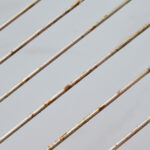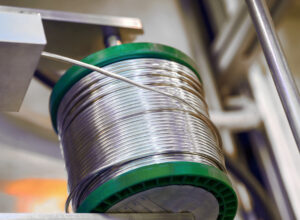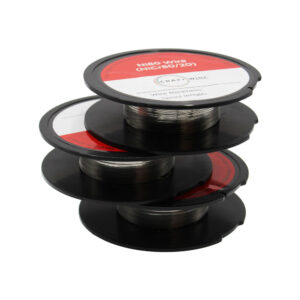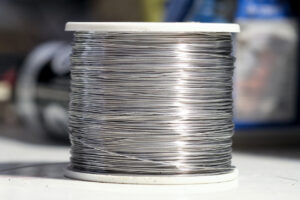When selecting wire for any project, one key property that often comes into consideration is flexibility. Particularly, the question arises: “Does the wire’s thickness impact its flexibility?” This consideration is crucial for users and industries that rely on the wire for a range of functions, from intricate electronics to heavy-duty structural support. The Crazy Wire Company offers a diverse array of round wires, from the ultra-fine 0.03mm to a more substantial 1.15mm, each serving different purposes based on their flexibility. Moreover, our line of galvanized steel tensioning wires, which can go up to 2mm in thickness, provides the necessary strength for more demanding applications. This article will delve into how the thickness of these wires influences their flexibility and, consequently, their suitability for various applications.
The Basics of Wire Flexibility
Wire flexibility refers to the ease with which a wire can be bent, twisted, or otherwise manipulated without breaking. This attribute is influenced by several factors, including the wire’s material composition, diameter, and the manufacturing process it has undergone. Generally, the thinner the wire, the more flexible it will be. This is because a smaller cross-sectional area allows the wire to bend more easily, whereas a thicker wire resists bending due to its larger area and increased material volume.
However, flexibility is not solely dictated by thickness. The material’s internal structure and the presence of any coatings or treatments can also play significant roles. For instance, a thinner wire that has been work-hardened may be less flexible than a thicker wire that is annealed or made of a naturally more ductile material.
Flexibility of Round Wire: 0.03mm to 1.15mm
Round wires from The Crazy Wire Company come in a variety of thicknesses, each with its unique set of properties. The ultra-fine 0.03mm wire offers exceptional flexibility, making it perfect for applications such as jewelry making or detailed electronic components where intricate shapes and turns are required. As the thickness increases, the wire becomes less pliable. The 1.15mm wire, while still flexible, offers more structural integrity and is thus suitable for applications where the wire must hold its shape under stress or weight, such as in certain types of braces or supports.
Galvanized Steel Line Tensioning Wire: Up to 2mm
Galvanized steel line tensioning wires are designed for strength and durability. The galvanization process, which coats the steel wire with a protective layer of zinc, not only combats corrosion but also can impact the wire’s flexibility. While inherently less flexible than thinner, non-steel wires, galvanized tensioning wires still offer a degree of pliability. Wires up to 2mm thick are commonly used in construction, fencing, and cabling, where they must withstand tension without stretching or snapping. These applications benefit from the wire’s ability to maintain tension while allowing for some flex, which can help absorb and distribute stress, preventing structural failures.
Comparing Flexibility Across Wire Types and Materials
Flexibility in wire is determined not just by thickness but by a complex interplay between material composition and physical dimensions. A comparative analysis reveals that round wires, especially those with diameters on the lower end of the spectrum like the 0.03mm wires, typically display greater flexibility due to their small cross-sectional area. As the diameter increases, the wire becomes stiffer; thus, a 1.15mm round wire will not bend as readily as its thinner counterparts.
Material composition further influences this flexibility. Stainless steel, for example, while robust and corrosion-resistant, is generally less flexible than softer metals like copper or aluminium of the same thickness. Galvanized tensioning wires, with their steel core and zinc coating, are designed for high tensile strength and minimal stretch rather than pliability. They are stiffer compared to non-galvanized or softer metal wires of similar diameters.
This inherent stiffness in galvanized wires, however, does not preclude all flexibility. They can flex slightly, which is critical to their function in applications where they must withstand forces without permanent deformation. The zinc coating on these wires also adds a layer of ductility, which can slightly enhance their ability to bend before breaking.
Choosing the Right Wire for Your Application
Selecting the right wire for any application is a delicate balance between flexibility and strength, along with considering other performance characteristics such as conductivity, corrosion resistance, and temperature tolerance. For applications requiring intricate bending and continuous movement, such as in robotics or wearable electronics, opting for a thinner, more malleable wire like 0.03mm round wire is advisable.
Conversely, applications that demand structural integrity and the ability to hold tension, such as in balustrades or fencing, would benefit from thicker, stiffer wires like 1.15mm round wires or up to 2mm galvanized tensioning wires. Understanding the demands of your application is crucial — consider the environmental conditions, the forces the wire will encounter, and the longevity required.
An informed decision on wire choice is paramount. For instance, in a marine environment, the corrosion resistance of stainless steel may take precedence, while in an artistic installation, the flexibility of a finer gauge wire could be the determining factor. Consulting with material experts or wire suppliers like The Crazy Wire Company can provide additional insights to ensure the wire you choose meets all the necessary criteria for your specific project needs.
Best Practices for Handling and Working with Wires of Varying Thicknesses
When handling and working with wires of different thicknesses, maintaining the integrity and performance of the wire is paramount. Here are some best practices:
Proper Storage: Store wires on spools or in coils to prevent kinking and tangling. Thicker wires should be stored so that they are not bent at sharp angles, which could stress and weaken the wire.
Correct Tools: Use the right tools for the job. Thinner wires can be cut and shaped with precision tools, while thicker wires may require more robust equipment. Ensure that cutting tools are sharp to avoid crushing the wire.
Gradual Bending: When bending wire, do so gradually to avoid work-hardening or breaking the wire. Tools like wire jigs or mandrels can help achieve consistent and smooth bends, especially in thicker wires.
Avoid Overworking: Repeatedly bending and straightening the same section of wire can lead to work-hardening and eventual breakage. Plan your work to minimise unnecessary manipulation of the wire.
Heat Treatment: For some applications, heat treatment can be used to increase the ductility of thicker wires before working with them, making them easier to manipulate.
Protective Coating: If abrasion is a concern, consider using wires with a protective coating or adding a sleeve to the wire to protect it from wear.
Safety Equipment: Always wear appropriate safety gear, such as gloves and eye protection, especially when cutting or handling ends of wire that may be sharp.
The flexibility of a wire is intrinsically linked to its thickness, with finer wires like the 0.03mm round wire offering more flexibility compared to the sturdier 2mm tensioning wire. Selecting the right wire thickness for your application is critical to achieving optimal performance. It’s essential to consider the wire’s intended use, the environment it will be used in, and the stresses it will endure to ensure that your choice meets the necessary performance requirements.
For those looking to explore a wide range of high-quality round and tensioning wires, The Crazy Wire Company is your trusted source. Visit our website to view our comprehensive selection and take advantage of the wealth of resources we offer. Should you need assistance, our experts are just a call or click away, ready to provide you with personalised support to select the perfect wire for your project. Don’t compromise on quality or performance—choose The Crazy Wire Company for all your wire needs.
We offer also a massive range of stainless steel wire and nichrome wire through our store. Choose the wire that you want to work with and we’ll get spooling.
If you’re interested in learning more about wire, check out our other blog on Everything You Need to Know About Wires.
We are also proud to supply this product on our highly popular eBay store, check us out there too.
Thank you for checking out our site.

Nichrome Wire Safety: Top Tips for Working Safely
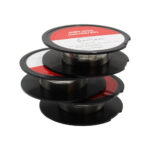
Best Wire for Electronics Projects
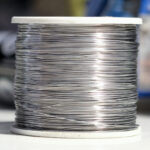
Is Ni80 Wire Suitable for DIY Heating Elements

Wire Grades Explained

How Wire Diameter Affects Strength and Flexibility

How to Cut and Shape Wire for Custom Applications

Can Wire Be Used in 3D Printing?

How Wire Composition Affects Conductivity
